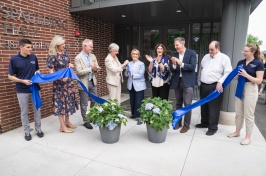The University of New Hampshire is a flagship research university that inspires innovation and transforms lives in our state, nation and world. More than 16,000 students from all 50 states and 71 countries engage with an award-winning faculty in top ranked programs in business, engineering, law, health and human services, liberal arts and the sciences across more than 200 programs of study. UNH’s research portfolio includes partnerships with NASA, NOAA, NSF and NIH, receiving more than $100 million in competitive external funding every year to further explore and define the frontiers of land, sea and space.
UNH Research Finds Clinton’s Defeat Result of Fewer Votes in Less Populated Areas of U.S.
DURHAM, N.H. – While Hillary Clinton nearly matched Barack Obama’s 2012 performance in most urban areas, her failure to match recent Democratic presidential nominees in less populated areas contributed to her defeat, according to new research released by the Carsey School of Public Policy at the University of New Hampshire.
The researchers examined voting along a rural to urban continuum, rather than treating rural and urban as a dichotomy. They found significant variations in voting behavior among both urban and rural places that persist over the last five presidential elections.
“Through the last five presidential elections voting patterns were consistent along a rural-urban continuum,” the researchers said. “Democrats did best at the urban end of the continuum and Republicans at the rural end. What is distinctly different in 2016 is that Hillary Clinton did far worse across the entire rural end of the continuum than any Democratic candidate in the previous four presidential elections.”
Clinton received 2.1 million fewer votes in rural America than Obama did four years earlier even though 531,000 more votes were cast there in 2016. Large urban counties are the base of the Democratic Party as well as their suburbs and the cores of smaller metropolitan areas. The outer edges of smaller urban areas and the vast rural regions tend to be Republican territory.
“Though many commentators argued that the faster population growth and growing diversity on the urban side of the rural-urban continuum would give Democrats a significant advantage in 2016, the election demonstrated that what happens at the rural end of the continuum remains important,” the researchers said.
The research was conducted by Dante Scala, associate professor of political science and a faculty fellow at the Carsey School, and Kenneth Johnson, senior demographer at the Carsey School and professor of sociology.
The Carsey School of Public Policy conducts research, leadership development, and engaged scholarship relevant to public policy. They address pressing challenges, striving for innovative, responsive, and equitable solutions at all levels of government and in the for-profit and nonprofit sectors.
The University of New Hampshire is a flagship research university that inspires innovation and transforms lives in our state, nation and world. More than 16,000 students from all 50 states and 71 countries engage with an award-winning faculty in top ranked programs in business, engineering, law, liberal arts and the sciences across more than 200 programs of study. UNH’s research portfolio includes partnerships with NASA, NOAA, NSF and NIH, receiving more than $100 million in competitive external funding every year to further explore and define the frontiers of land, sea and space.
Latest News
-
June 25, 2025
-
June 16, 2025
-
June 6, 2025
-
May 15, 2025
-
May 14, 2025
















































